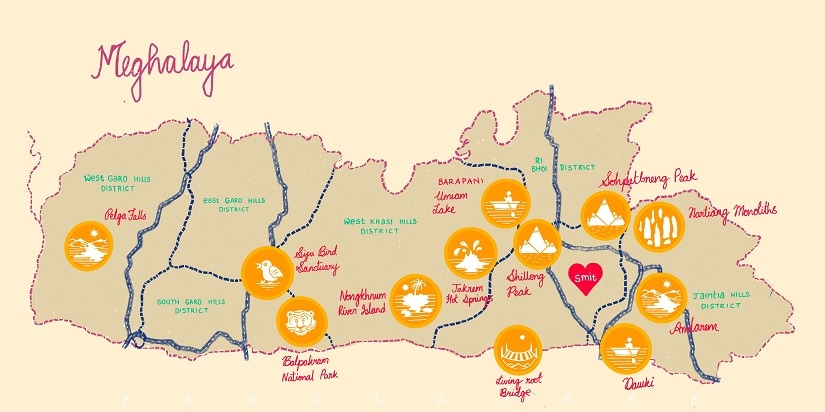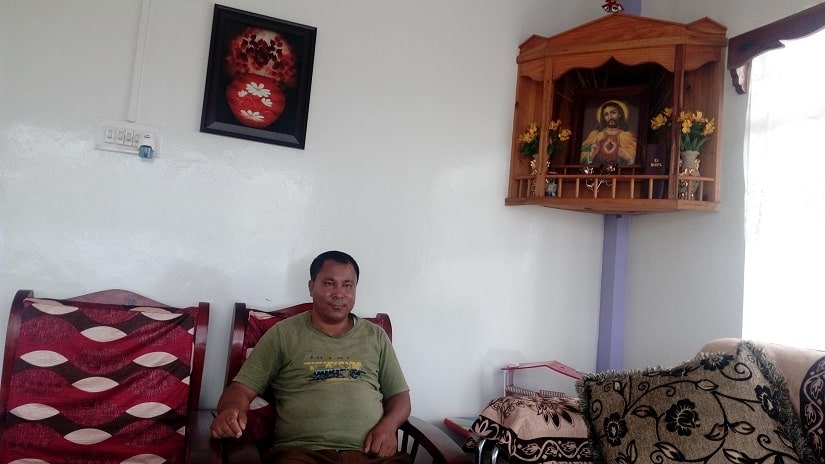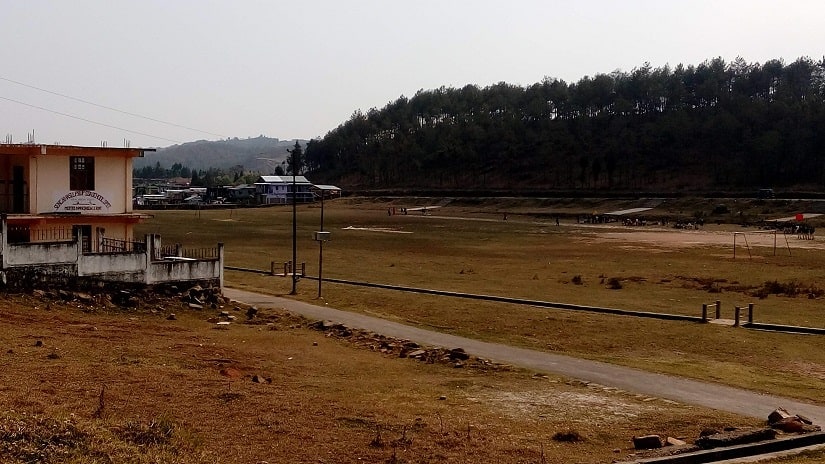“How does governance work at the grassroots level in India?” To examine this question, we decided to pick one village anywhere in India, become a part of the community, see how individuals interact with various bodies of the government and examine its impact on their lives. I knew the answers to this question would be further complicated if the village didn’t identify as ‘India’, or simply didn’t care about that label — as is the case in large parts of the Northeast. In a region where ‘the outsider’ is a constant threat to a way of life, how do locals navigate a system where ‘outsiders’ are an explicit part of governance? It was to delve into these issues that I ended up living and working out of a village called Smit, in Meghalaya. This six-part series documents my time in Smit. [caption id=“attachment_7819151” align=“alignnone” width=“825”]  Smit, Meghalaya. Illustration courtesy Satwik Gade/Firstpost[/caption] 1\. The Outsiders 2\. Village Tour 3. Seng Khasi When the British first reached Meghalaya through present-day Bangladesh, they weren’t exactly welcomed. Any attempt to approach the wary indigenous people would end in bloodshed. The British brought religion to the region; they opened Christian schools that taught the Bible, hospitals that offered advanced medical care, gradually making inroads into the populace. The British also brought alcohol, which the locals weren’t used to (having previously only consumed small quantities of rice beer) and quickly developed a taste for. With education restricted to the primary level, the Bible, and alcohol, the locals were made subservient to the British, easy to exploit. However, a group of 16 individuals who managed to leave the region and gain college educations in Calcutta, realised the British depredations within their community needed to be urgently addressed. This group came to an understanding that the community’s rituals and customs needed to be formalised into a proper religion to stymie further conversions and the resultant exploitation. On 23 November 1899, these 16 men came together in Smit to form a new religion called Seng Khasi. “Seng” means beginning or foundation, and Khasis are the indigenous people of the area. Interestingly, the leader of the group and among the founders of the religion was a Bengali (from present-day Bangladesh), Babu Jeebon Roy. Before 1979, there were lots of Bengalis in this area. Without a script of its own, the Khasi language was written in Bengali. (A Christian missionary later changed it to the Roman script, and that’s how it is written now.) The religion rests on three tenets: 1. Tip Briew Tip Blei — knowing humans is to know God, 2. Tip Kur Tip Kha —knowledge about your clan, 3. Kamai Yakahok — to earn by righteous means and take only what is yours. According to Khlain Sing Warshong, the only English-speaking Seng Khasi member in Smit village, the followers of the religion are called “Hynniew Trep” (seven huts). The name is a nod to the seven huts present on Earth, in which we live. A pilgrimage site at Lake Umiam apparently marks where these huts existed. Warshong says that as per Seng Khasi belief, heaven and earth were connected earlier, by a tree. People would work on earth during the day, returning to the huts in heaven at night, to rest. One day, the devil cut the tree, but at night, a tiger licked the hewn-off portion and it grew back. This happened several times, until the devil grew angry and hid a knife in the sawn-off part of the tree. This time, when the tiger attempted to lick the tree and heal it, its tongue was slashed. Ever since, the link between heaven and earth has been lost. There is no hell in Seng Khasi belief — we pay for our deeds during our lifetimes. Perhaps that explains why the Seng Khasi live in a way “that our ancestors will approve of”, “otherwise we will be left here,” says Warshong. Khasis still undertake the pilgrimage to Lake Umiam, as do people from the Jaintia hills, Bhoi, Khasi and Maram (those who haven’t converted to Christianity, that is). [caption id=“attachment_7825741” align=“alignnone” width=“825”]  Khlain Sing Warshong is the only English-speaking Seng Khasi member in Smit village. Photo by Parul Abrol/Firstpost[/caption] [caption id=“attachment_7825751” align=“alignnone” width=“825”]  A Seng Khasi school in Smit. Photo by Parul Abrol/Firstpost[/caption] Every year, to celebrate the founding of the religion, Seng Khasis congregate in Smit. The gathering marks a festival called Lympung. There are traditional, cultural programmes, as well as debates and discussions among the youth on the religion and its philosophy. At night, people celebrate around a bonfire. Warshong’s wife is a Catholic, and they’ve left it to their children to determine which religion to follow when they’re adults. Warshong says he doesn’t have a problem with Christianity, although he blames the religion for most social wrongs. He believes it is the Christians who drink alcohol and create a ruckus (Seng Khasis drink only rice beer) and also that their practice of burying the dead is bad for the environment — land is for growing food. Inter-marriage, the Seng Khasis believe, have taken them away from God. Earlier, the maternal uncle was considered the most powerful member of the family; it fell to him to conduct ceremonies, or resolve problems and filial disputes. Now, if the uncle is Christian, he cannot ‘converse’ with the God anymore. In such cases, people go to a Nongsha Nongkhai (shaman) who tries to put things right. Warshong says Seng Khasis communicate with all living things, be they human or animal. Confronted with a snake, for instance, a Khasi will ask it to go on its way, and it would. They could also talk to nature; during their festival, they prayed so it wouldn’t rain. Even if the Khasis have formalised their religion, it has very strong pagan roots. All the rituals, customs and beliefs match other tribal people’s beliefs and customs very closely. So as to promote and preserve Seng Khasi, as also to prevent more conversions, followers have started their own schools and colleges. (There was a Seng Khasi school right next to my house in Smit, and there is a college in Shillong.) They invite others to join the school and college as well; moral instruction is restricted to one lecture a week. Children are taught about the religion in weekly meetings called Seng Pyni. To keep morale up and people interested, they also have Seng Kyrsiew — the practice of going to another village and motivating people to remain Khasi. Warshong says the Seng Khasi believe we have come to Earth through the blessings of [a] grandmother and the command of God. Whoever comes to Earth, will receive food. In part 4, a conversation with Mei Tew
Smit, in Meghalaya, fluctuates between its old and new values and systems, navigating the pull of modernity and tradition. Follow Parul Abrol as she follows Smit’s stories — a different world, within our own | Part 3 of 6
Advertisement
End of Article


)

)
)
)
)
)
)
)
)



